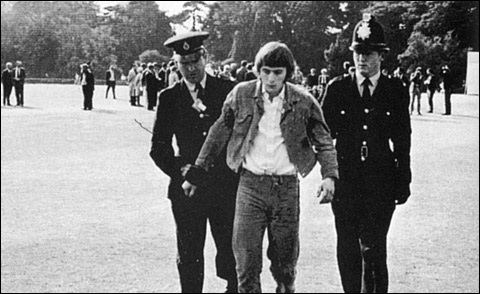
OXFORD, 1968 Hitchens spent the lion’s share of his time engaged in extracurricular activities. |
Despite admirable wall-to-wall coverage from the national mainstream press and unusually in-depth reports from network television and cable, the Huffington Post has emerged as perhaps the single best go-to source for developing news and wide-ranging commentary about the British Petroleum (BP) oil spill in the Gulf of Mexico.
My experience using HuffPost to follow other big stories may be eccentric, but there have been times in the past when the sheer volume and diversity of contributions has been, if not overwhelming, then not conducive to clarity.
It just occurs to me that, in reflecting upon HuffPost's Gulf performance, I may well be seeing the fruits of a slow but sure professionalization of standards: solid, in; marginal, out.
With a story such as the Gulf eco disaster, HuffPost enjoys a distinct advantage over its mainstream competitors. It has a clear point of view: environment, good; BP, bad.
It's not as if the New York Times, the Washington Post, and the Wall Street Journal are exactly giving BP the benefit of any doubt. It is that the "on-the-one-hand, on-the-other-hand" imperatives of daily journalism give a decided advantage to a media outlet with both factual integrity and a strong point of view.
Channel surfing Tuesday morning to catch television's latest round of stories, I saw BP CEO Tony Hayward saying two things. First, Hayward said he was sorry for the "disruption" — understated, but fair enough. Then he added, "I'd like my life back" — undoubtedly true, but the words of a massively self-obsessed twit.
Gazelle Emami, a HuffPost Green Team contributor who has been doing yeoman work on this story, set up her version — video by Think Progress — with just the right balance of outrage and analysis.
In fact, for the general-news consumer, HuffPost Green may be the most satisfying and efficient way to follow this saga of corporate arrogance, incompetence, and banditry.
A glance at just a handful of pieces on the site's Green page reveals news that former vice-president Dick Cheney's old press secretary has been retained by BP as a spokesman; a meditation by Robert Kuttner on BP and the banks; a recommendation by Robert Reich on why President Barack Obama should place BP in temporary receivership; and a lucid but wonkishly respectable essay by Karin Lissakers of the Revenue Watch Institute explaining the pressing need for corporate transparency.
When it launched five years ago, Huffington Post more or less hit the ground running. It picked up traction and credibility during the 2008 presidential election and the financial meltdown that ran concurrent with it. Its Gulf performance bolsters its claim to be the Internet newspaper.
The importance of being Hitch
In a more pleasing world, Christopher Hitchens would have been born with a triple-barreled surname, something along the lines of, say, Digby-Vaine-Trumpington.
Christopher Digby-Vaine-Trumpington. Yes, that would work.
Having finished Hitchens's generally entertaining, somewhat enlightening, occasionally annoying, and unfortunately titled autobiography Hitch-22, I can't be altogether sure that the great man himself might not agree.
If Hitchens had a family crest, its motto might read, "Eat with the Tories, vote with the Liberals — and, by all means, bomb Baghdad."